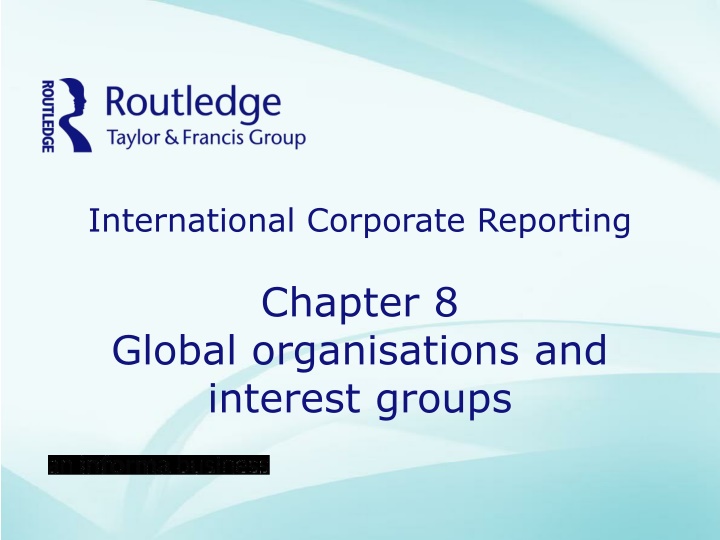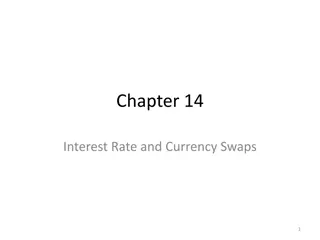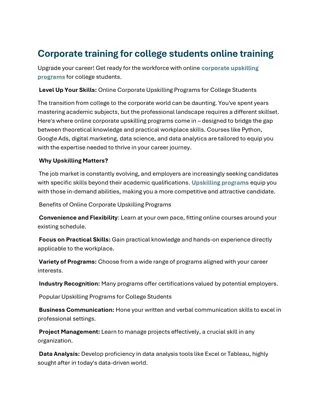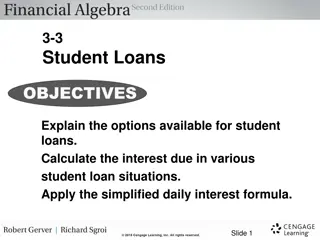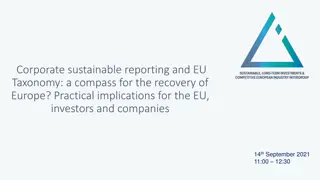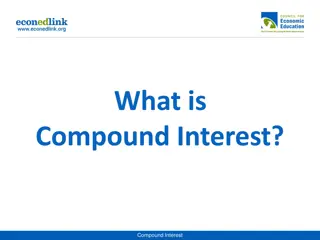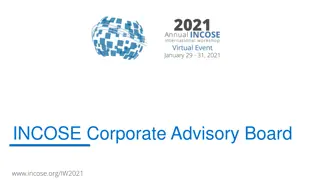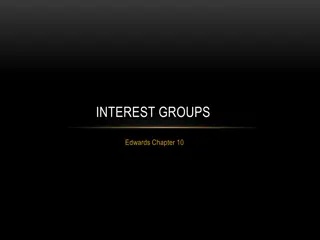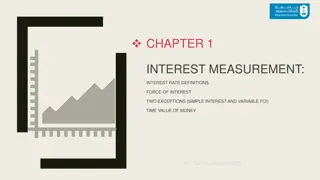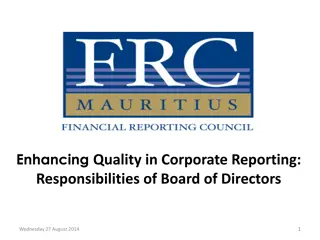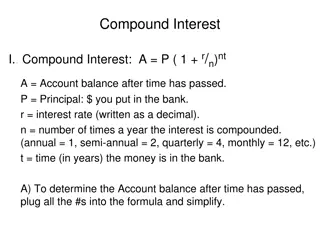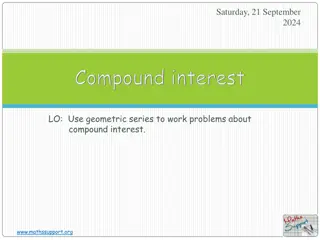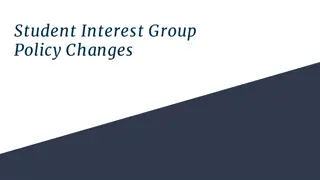Global Organizations and Interest Groups in Corporate Reporting
The Group of 20 (G20) consisting of finance ministers and central bank governors from 19 countries and the European Union plays a significant role in influencing global financial stability and regulations. The G20 responded to the 2008 financial crisis by focusing on improving financial reporting standards and institutions, leading to the establishment of the Financial Stability Board. This board works towards promoting international financial stability and collaborates with key organizations such as the World Bank, IMF, OECD, IASB, and IOSCO, reflecting on reforms and addressing new risks annually.
Download Presentation

Please find below an Image/Link to download the presentation.
The content on the website is provided AS IS for your information and personal use only. It may not be sold, licensed, or shared on other websites without obtaining consent from the author.If you encounter any issues during the download, it is possible that the publisher has removed the file from their server.
You are allowed to download the files provided on this website for personal or commercial use, subject to the condition that they are used lawfully. All files are the property of their respective owners.
The content on the website is provided AS IS for your information and personal use only. It may not be sold, licensed, or shared on other websites without obtaining consent from the author.
E N D
Presentation Transcript
International Corporate Reporting Chapter 8 Global organisations and interest groups
Group of 20 (G20) Finance ministers and central bank governors of 19 countries and the European Union. Argentina, Australia, Brazil, Canada, China, France, Germany, India, Indonesia, Italy, Japan, Mexico, Russia, Saudi Arabia, South Africa, Republic of Korea, Turkey, United Kingdom and United States of America. Following meetings of the G20, a report called a communiqu is issued, setting out their concerns and suggesting ways forward.
Influence of G20 2008 financial crisis: G20 began to explore ways to improve the global financial system. They took particular interest in regulations related to financial reporting and institutions. 2008 November in S o Paulo, Brazil, members noted that the financial crisis was largely a result of excessive risk taking and faulty risk management practices in financial markets, inconsistent macroeconomic policies, which gave rise to domestic and external imbalances, as well as deficiencies in financial regulation and supervision in some advanced countries
Influence of G20 (contd) 2008 recommended the accounting standard setters to work urgently with supervisors and regulators to improve standards on valuation and provisioning and achieve a single set of high- quality global accounting standards . This led IASB to focus on developing IFRS 9 and IFRS 13 in particular.
Financial Stability Board Established following the 2009 meeting of the G20 leaders, with the aim of promoting international financial stability. Member bodies include: The World Bank The International Monetary Fund (IMF) Organisation for Economic Co-operation and Development (OECD) International Accounting Standards Board (IASB) International Organization of Securities Commissions (IOSCO)
Financial Stability Board actions FSB reports annually to the G20. In its 2018 report, the FSB reflected on ten years of delivering the G20 s required reforms and concluded that the G20-initiated reforms had strengthened the core of the financial system so that it would likely absorb, rather than amplify, most shocks. The work of the FSB could now move on to evaluating the continued effectiveness of the reforms, adjusting them where necessary, and implementing new policies to address new risks.
FSB designates key standards The key standards and initiatives for sound financial systems include: IFRS Standards International Standards on Auditing (ISAs) G20/OECD Principles of Corporate Governance Task Force on Climate-related disclosures
International Integrated Reporting Council (IIRC) Global coalition of regulators, investors, companies, standard setters, the accounting profession and non-governmental organisations (NGOs). Mission is to establish integrated reporting and thinking within mainstream business practice as the norm in the public and private sectors. 2013 published The International <IR> Framework.
<IR> Framework Six capitals: Financial, Manufactured, Intellectual, Human, Social & Relationship, Natural.
<IR> Framework (contd) Content elements to an <IR> report: A Organisational overview and external environment B Governance C Business model D Risks and opportunities E Strategy and resource allocation F Performance G Outlook H Basis of preparation and presentation No prescribed format
Status of <IR> reporting South Africa: listed companies on the Johannesburg Stock Exchange (JSE) have been required since 2010 to adopt Integrated Reporting. Driven by the King Code of Governance Principles for South Africa 2009 ( King III ) becoming a JSE listing requirement. King IV Report was issued in 2016 and places close reliance on the International <IR> Framework of the IIRC.
Development of <IR> reporting 2009 The Prince of Wales, working with the Global Reporting Initiative (GRI) called for a globally accepted framework for accounting for sustainability. 2010 The IIRC was formed. On the governing council those who might be regarded as promoting social and environmental issues were considerably outnumbered by the representatives of what might be regarded as regulators, preparers and standard-setters.
Is the IIRC project successful? Non-mandatory except in South Africa. No specific format so companies can claim compliance in many ways. IIRC points to number of companies signing up to its aims. Identifying value creation may encourage investment. Researchers find low familiarity with, and usefulness of, <IR> reporting among preparers and analysts. Little research into impact.
IOSCO Members regulate more than 95% of the world's securities markets in more than 115 jurisdictions. Securities regulators in emerging markets account for 75% of its ordinary membership. IOSCO Objectives and Principles of Securities Regulation have been endorsed by both the G20 and the FSB as the relevant standards in this area.
IOSCO and accounting 2000 (IOSCO) endorsed IAS Standards in for use in members stock exchanges, in order to facilitate cross-border offerings and listings by multinational enterprises, and promote further development of internationally accepted accounting. 2005, IOSCO made a significant statement of support for the development and use of IFRS Standards as a set of high quality international standards in cross- border offerings and listings. 2016, IOSCO made a statement weighing the arguments for and against reporting non-GAAP financial measures.
International Valuation Standards Council (IVSC) Global standard setter for the valuation profession, serving the public interest. Asset standards: Businesses and Business Interests Intangible Assets Plant and Equipment Real Property Interests Investment Property under Construction Financial Instruments
IESBA (Ethics code) IESBA Code requires five basic principles: Integrity Objectivity Professional competence and due care Confidentiality Professional behaviour Professional bodies set their own codes based on these principles
Ethics and NOCLAR Where there is non-compliance with laws and regulations (NOCLAR), how should auditors act? Balance client confidentiality against the public interest. Make management aware? Resign from audit? Disclosure to regulators, with or without first warning the client ( tipping off ). Would a third party, weighing all specific facts and circumstances at the time, likely conclude that the auditor has acted appropriately in public interest?
IAESB (Education) Serves the public interest by establishing standards in the area of professional accounting education that prescribe technical competence and professional skills, values, ethics, and attitudes. Pre-qualification education and training, also continuing professional education and development Eight standards cover the expected levels of technical knowledge and the expected professional skills to be evident in the education and training of a newly-qualified professional accountant.
Regional groups in accountancy profession Continuing need to support professional accountancy organisations, particularly in emerging economies and to research the progress of such activity. Examples are: Accountancy Europe Accounting and Auditing Organization for Islamic Financial Institutions (AAOFI) Asian-Oceanic Standard-Setters Group (AOSSG) Group of Latin American Accounting Standard Setters (GLASS) Pan African Federation of Accountants (PAFA)
Research examples Political influence on standard setting documentary evidence of pressures on IASB during financial crisis. <IR> and investment behaviour Interviews on decision usefulness and short-term pressures. <IR> and preparers of reports interviews on practicalities and credibility of reports. Ethics and earnings management related access to ethics codes with evidence of abnormal discretionary accruals.
